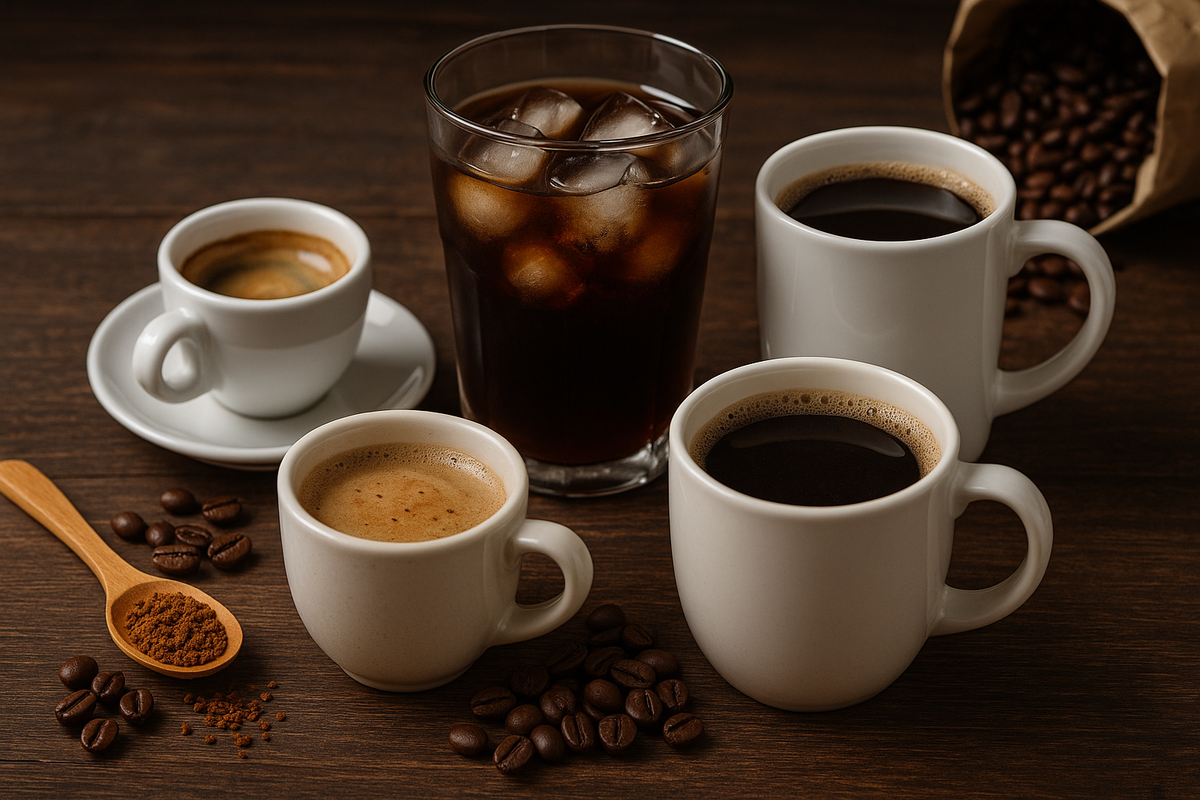
What is the caffeine content of your coffee ?
Time to read 4 min
Time to read 4 min
Table of Contents
"This coffee is strong, isn't it?"
We often hear this phrase... but what does it mean exactly? Is it the full-bodied taste, the bitterness, or the caffeine level Who makes us say that?
We're often asked how much caffeine a particular coffee contains. While it's difficult to say for a single bean (it depends on several factors such as variety, roasting, etc.), we can be more precise when talking about recipes: espresso, filter, long, instant... Follow the guide!
If we talk about concentration, espresso is king. It is prepared by rapidly extracting a small amount of liquid through finely ground coffee, under high pressure. Result: approximately 63 mg of caffeine in a single shot (30 ml).
But be careful, it is not the drink that contains the most caffeine in totalA large cup of filter coffee, for example, can hold up to 95 mg, or even more, depending on the quantity used and the infusion time.
👉 Espresso = short coffee with an intense taste.
👉 Filter = milder coffee, but often more caffeinated in the end.
Voici une estimation des teneurs moyennes en caféine, à volume standard :
Type de café Volume Caféine (mg) Concentration approx.
| Espresso | 30 ml | ~63 mg | ~2,1 % |
| Café filtre | 240 ml | ~95 mg | ~1,2 % |
| Café instantané | 240 ml | ~63 mg | ~0,8 % |
| Cold brew (infusion à froid) | 240 ml | ~100–200 mg* | ~1,5–2,5 % |
| Décaféiné | 240 ml | 2 à 5 mg | < 0,1 % |
*Le cold brew est souvent très caféiné, surtout si il est concentré. Cela dépend du ratio café/eau et du temps d’infusion.
À noter :
Ces chiffres peuvent varier selon les grains utilisés, la finesse de la mouture, la torréfaction, et bien sûr la taille de votre tasse. Il ne s'agit que d'ordres de grandeur.
Drinking coffee doesn't work instantly... and its effects last much longer than you think.
Here's what happens after you drink a cup:
This explains why a late afternoon espresso can disrupt your sleep, even if you "don't feel it."
🧠 Tip: To better manage your energy (and your sleep), it is sometimes better to space out the coffees than chaining the doses.
Good question!
Many people think that espresso is always "stronger." In reality, it all depends on what you call "strong": intense taste Or amount of caffeine ?
An espresso is very concentrated — strong in the mouth, and yes, strong in caffeine per milliliter. But a long coffee, which uses more water and therefore more coffee in total, may contain more caffeine overall.
For example :
Espresso: ~63 mg per 30 ml
Filter or long coffee: ~95 mg per 240 ml
Moral: don't trust taste alone!
A few key factors influence caffeine content:
Grain type : L'Arabica contains about 1.2% caffeine, while the Robusta can reach 2.2%.
Roasting : the more it is pushed, the more the beans lose weight... but the caffeine concentration remains fairly stable.
Extraction method : slow infusion (filter, cold brew) = more complete extraction = more caffeine.
Amount of coffee used : logical, but often underestimated!
Espresso is the most concentrate, but not necessarily the most caffeinated per cup.
Filter or long coffee often contains it more globally.
Caffeine depends on many parameters: grains, method, volume, etc.
And yes, even the decaffeinated contains a little caffeine!
Caffeine isn't inherently bad—it can improve alertness, mood, and concentration. But in excess, it can cause nervousness, sleep disturbances, and even palpitations.
The European Food Safety Authority (EFSA) recommends not to exceed 400 mg per day for a healthy adult, approximately:
5–6 espressos
3–4 large cups of filter coffee
As always: it's all about balance... and fun!
Estimate your consumption based on your weight and your favorite coffees:
Does an espresso have more caffeine than a filter coffee?
Not necessarily! By volume, yes (espresso is a concentrated bomb 💣), but if you drink a 250 ml cup of filter coffee… you’re ingesting a lot more caffeine in total. The bottom line: it’s all in the cup size (not the punch)!
Is decaf really caffeine-free?
Not at all! He's playing hide-and-seek instead. Decaffeinated coffee still contains between 2 and 15 mg of caffeine , depending on the method used. It's not much, but it's not zero. So, if you drink 5 decafs before bed... don't be surprised if you dream in fast motion 😴⚡
Is cold brew the Hulk of caffeine?
Absolutely 🟢. Because it brews for a long time (often 12 hours+), it extracts a lot of caffeine, sometimes more than 200 mg per serving If you're looking for a gentle yet powerful hit, cold brew is your friend.
How many coffees can I drink a day without exploding?
According to Health Canada , a healthy adult can consume up to 400 mg of caffeine per day , or about 3 to 4 cups of 250 ml filter coffee.
For pregnant or breastfeeding women, the limit is rather 300 mg/day.
For those under 18, Health Canada recommends a maximum consumption of 2.5 mg of caffeine per kilogram of body weight.
⚠️ Things to watch out for: Adding energy drinks, strong teas or colas can increase the dose without you realizing it – Health Canada specifically mentions their contribution in this calculation.
Does taste intensity = more caffeine?
Myth! A “strong” coffee doesn’t necessarily mean more caffeine. Sometimes a light Arabica hides its true colors, while an earthy Robusta will knock your socks off. 💥Moral: don't trust your palate, look at the technical specifications.
Your cart is currently empty.
Start Shopping











